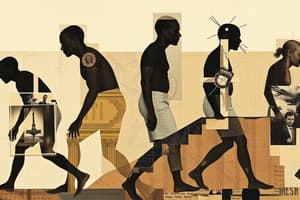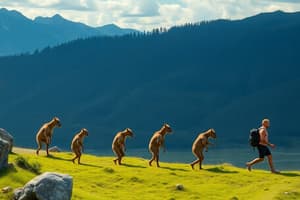Podcast
Questions and Answers
What does natural selection enable organisms to do?
What does natural selection enable organisms to do?
- Adapt and change in response to the environment (correct)
- Become genetically superior to other groups
- Compete more effectively against other species
- Maintain their existing traits without change
How does ethnocentrism relate to cultural perception?
How does ethnocentrism relate to cultural perception?
- It encourages the acceptance of all cultural practices without question.
- It promotes understanding and appreciation of other cultures.
- It suggests that all cultures should be judged by universal standards.
- It centers one's own group as the primary reference point for all cultures. (correct)
Which of the following best defines cultural relativism?
Which of the following best defines cultural relativism?
- A method of cultural preservation without adaptation.
- Understanding cultural values relative to their specific context. (correct)
- Belief in universal cultural standards to measure all cultures.
- The assumption that all cultures are inherently inferior.
What does biological evolution primarily refer to?
What does biological evolution primarily refer to?
Which statement best describes the principles of natural selection according to Charles Darwin?
Which statement best describes the principles of natural selection according to Charles Darwin?
Study Notes
Natural Selection and Adaptation
- Natural selection is a strategy for adaptation in organisms, enabling them to adjust and evolve based on environmental conditions.
- It emphasizes that survival does not rely solely on strength or intelligence, but rather on adaptability to changes.
Ethnocentrism
- Ethnocentrism, as described by William Graham Sumner, views one's own group as central, evaluating all others in relation to it.
- This perspective is often tied to racism, stereotypes, and discrimination against other cultural or ethnic groups.
Cultural Relativism
- Cultural relativism posits that there are no universal standards for measuring cultures; values and beliefs should be understood within their own cultural context.
- It encourages viewing cultures based on their unique norms rather than through the lens of external influences.
Biological Evolution
- Biological evolution is defined as genetic changes and variations within populations over generations.
- It highlights the importance of genetics in the evolutionary process and how traits are inherited.
Human Evolution
- Human evolution represents the transformative pathway that led to the emergence of modern humans.
- Hominids are recognized as the direct ancestors of Homo species, indicating a lineage of evolutionary development.
Cultural Evolution
- Cultural evolution refers to the progression and transformation of cultures from simpler to more complex forms.
- It addresses how human practices, beliefs, and societal structures evolve over time.
The Origin of Life
- Various perspectives on the origin of life include religious narratives of creation and scientific theories of evolution.
- The interplay between these perspectives shapes the understanding of life's beginnings in different cultures.
Charles Darwin's Theory of Natural Selection
- Darwin's framework of natural selection explains how certain traits become more prevalent in a population over generations based on their advantages for survival.
- This theory is foundational in understanding biological changes and the diversification of species.
Studying That Suits You
Use AI to generate personalized quizzes and flashcards to suit your learning preferences.
Description
This quiz explores the concepts of natural selection, ethnocentrism, and cultural relativism, alongside the mechanisms of biological evolution. Understand how adaptability influences survival in nature and how cultural perspectives shape our views on different groups. Test your knowledge on these important topics in biology and sociology.




